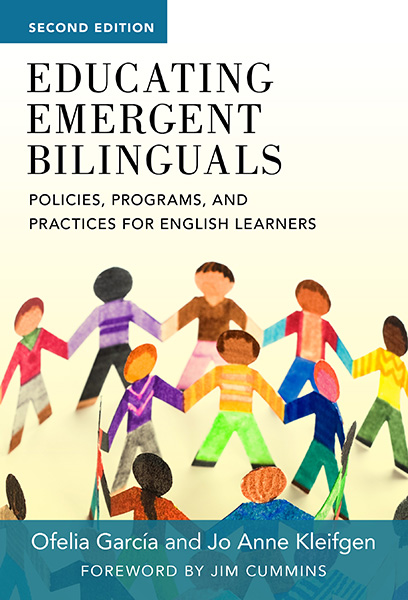Professors: Request an Exam Copy
Print copies available for US orders only. For orders outside the US, see our international distributors.
Second Edition
Ofelia García, Jo Anne Kleifgen
Foreword by: Jim Cummins
Publication Date: April 13, 2018
Pages: 256
Series: Language and Literacy Series

Now available in a revised and expanded edition, this accessible guide introduces readers to the issues and controversies surrounding the education of language minority students in the United States. What makes this book a perennial favorite are the succinct descriptions of alternative practices for transforming our schools and students’ futures, such as building on students’ home languages and literacy practices, incorporating curricular and pedagogical innovations, using proven-effective approaches to parent engagement, and employing alternative assessment tools.
The authors have updated their bestseller to reflect recent shifts in policies, programs, and practices due to globalization and the changing economy; demographic trends; and new research on EL pedagogy. A totally new chapter highlights multimedia and multimodal instructional possibilities for engaging EL students.
This Second Edition is essential reading for all teachers of language-minority students, as well as principals, superintendents, and policymakers.
Book Features:
Ofelia García is a professor in the PhD programs in Urban Education and Latin American, Iberian, and Latino Cultures at The Graduate Center of The City University of New York. She received the 2024 Literacy Research Association (LRA) Distinguished Scholar Lifetime Achievement Award. Jo Anne Kleifgen is professor emerita of Linguistics and Education at Teachers College, Columbia University.
“This is a must-read not only for teachers of language-minority students, but also for school principals, policymakers, teacher educators, and researchers looking to promote socially-just, equitable education for emergent bilingual students.”
—International Journal of Multilingualism
"...we recommend this text without hesitation and with a particular nod to its call to action; rather than simply teaching the reader about inequities, this book prompts us to do something, inciting change for the good of all."
—Teachers College Record
"An excellent resource for policymakers, researchers, and educators who are interested in taking specific action to improve the education of English learners."
—Linguistics and Education (of first edition)
"Perhaps once or twice a decade you read a book that is so lucid, convincing, and inspirational that you want to order copies for every teacher, administrator, and policymaker across the nation. Ofelia García and Jo Anne Kleifgen have written such a book."
—From the foreword by Jim Cummins, professor emeritus, University of Toronto
"This is the book that every educator in 21st-century USA should read. Few will not have students from other-than-English backgrounds at some point. García and Kleifgen explain in highly accessible prose both the why and how of instruction for emergent bilinguals (ELs) and why it matters so much that we get this right."
—Patricia Gándara, co-director, The Civil Rights Project at UCLA
“In the second edition of this important book, García and Kleifgen show the continued disconnect between research that points to the rich cultural and linguistic resources of minoritized emergent bilinguals and policies and practices that at best ignore these resources and at worst treats these resources as deficits in need of remediation. The authors further develop their blueprint for developing educational policies and practices that insists on the naming of the bilingualism of these students and treating this bilingualism as a resource for teaching and learning. This book is a must read for researchers, policymakers and practitioners interested in improving the education of minoritized emergent bilinguals.”
—Nelson L. Flores, University of Pennsylvania
Foreword by Jim Cummins
Acknowledgments
Preface
Chapter 1. Introduction
Emergent Bilinguals
What’s in a Name?
This Book
Chapter 2. Who Are the Emergent Bilinguals?
How Do We Know Who They Are?
How Many Emergent Bilinguals Are There?
How Are They Designated?
How Are They Reclassified?
Where Do They Live and Go to School?
What Languages Do They Speak?
What Are Their Demographic Characteristics?
What is Their Use of Language?
Who Are the Latinx Emergent Bilinguals?
Educating Emergent Bilinguals: Knowing Who They Are
Chapter 3. Programs and Policies for Educating Emergent Bilinguals
Educational Programs for Emergent Bilinguals
A Brief History of Educational Policies for Emergent Bilinguals
Programs and Policies for Emergent Bilinguals: Understanding the Shifts
Chapter 4. Bilingualism and Achievement: Theoretical Constructs and Empirical Evidence
Theoretical Constructs
Empirical Evidence on the Relationship Between Bilingualism and Achievement
Educating Emergent Bilinguals: Building on Bilingualism for Academic Success
Chapter 5. Language and Bilingualism: Practices
Inequitable Language/Literacy Practices
Alternative Language/Literacy Practices
Educating Emergent Bilinguals: Incorporating Multilingual Pedagogies
Chapter 6. Affordances of Technology
Theoretical Underpinnings
Inequitable Access to Digital Technologies
How Digital Technologies Can Benefit Emergent Bilinguals
Resourcing Emergent Bilinguals' Classrooms
Educating Emergent Bilinguals: The Important Role of Technology
Chapter 7. Curriculum and Other Practices
Theoretical Curricular and Pedagogical Constructs
Inequitable Curricular Opportunities and Resources
Alternative Curricular Practices and Preparing Caring Educators
Educating Emergent Bilinguals: Embracing Challenge and Care
Chapter 8. Family and Community Engagement
Research and Theories on Parental and Community Involvement
Inequities in School and Family/Community Relations
Alternative Approaches to Parent and Community Engagement
Educating Emergent Bilinguals: Re-creating the School-Family-Community Connections
Chapter 9. Assessments
Theoretical Constructs in Assessment
Inequitable Assessment Practices
Alternative Assessment Practices
Educating Emergent Bilinguals: Accounting for Fair Assessment
Chapter 10. Signposts: Conclusion and Recommendations
What Have We Learned?
Signposts: Policy Recommendations
Educating Emergent Bilinguals: Alternative Paths
Notes
References
Index
About the Authors
Ofelia García, winner of the 2024 Literacy Research Association Distinguished Scholar Lifetime Achievement Award
Professors: Request an Exam Copy
Print copies available for US orders only. For orders outside the US, see our international distributors.